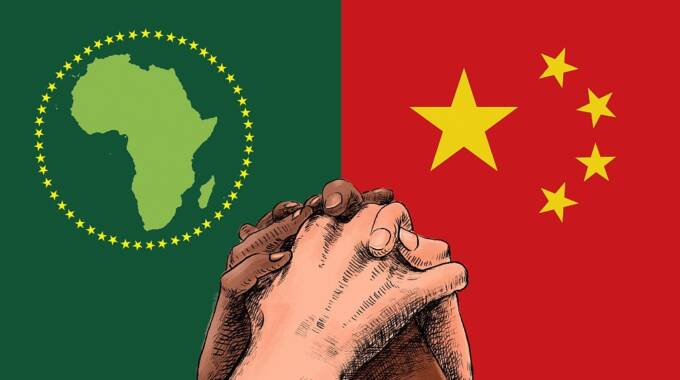
The Sunday Mail

Jameel Asani
WHEN the African Union’s 37th Summit ended in February this year, Chinese President Xi Jinping pointed out that the world is undergoing profound changes unseen in a century, indicating that the Global South, represented by China and Africa, is booming.
China has a relationship with Africa that goes back to the struggle for liberation of many African countries.
This relationship has grown stronger as China emerges as a world economic superpower.
However, the Western world appears to be struggling to understand or accept China’s new status and its relationship with Africa.
In an article published in the Journal of Asian and African Studies (2022), Dr Franklin Obeng-Odoom analysed the portrayal of China-Africa relations by The Economist, a prominent British magazine, between 2019 and 2021.
He argues that there has been a tendency, mainly in the West’s mainstream media, to draw similarities between China’s relations with Africa with the colonial project, the “Scramble for Africa”.
The “Scramble for Africa” refers to historical colonial exploitation.
The Economist’s coverage may reflect Western bias, distorting the Global South’s portrayal and reinforcing Western dominance while mocking ambitions that defy Western norms.
Their portrayal of Global South development, particularly China-Africa relations, has to be critiqued as it reflects an adherence to Western media’s myopic capitalism narrative and misrepresentation.
Scholars such as Dr Obeng-Odoom have managed to contrast these views with alternative perspectives.
They also accuse The Economist of propagating Western economic and political dominance while downplaying South-South cooperation and mis-framing China’s engagement in Africa as neo-colonial.
The Economist’s bias reflects a longer history of Western media framing Africa in terms of inferiority and dependency rather than as an equal partner in global development.
In the book “A Post State-Centric Analysis of China-Africa Relations: Internationalisation of Chinese Capital and State-Society Relations in Ethiopia”, Dr Edson Ziso posits that Chinese investment in Africa has sparked diverse views that often reflect stereotypes of China rather than African realities.
Some see China’s presence as predatory or a chance for new developmental pathways divergent from Western-imposed neoliberalism.
This book adopts an “inside out” approach, examining how Chinese economic ties, especially capital, integrate within African states, using Ethiopia as a case study.
It challenges views of the African state as either independent of or dominated by China, looking instead at state-society dynamics within Ethiopia to provide a nuanced understanding of the impact of Chinese investment.
Dr Ziso examines China’s influence in Africa as a dynamic interaction, rather than one-sided exploitation, framing the African state as an active participant shaped by various social forces.
He explores internal changes due to Chinese investment within the context of South-South cooperation — a partnership model among developing nations encompassing political, economic and social collaboration, where countries exchange resources, knowledge and expertise to achieve collective development goals, including trade, investment and regional integration.
The “inside out” approach employed by Dr Ziso in his research explores how Chinese investment affects state-society relations in Africa, especially Ethiopia, within South-South dynamics.
It highlights the interaction of domestic and international factors, with China’s unique form of state-centric capitalism influencing Ethiopia’s political economy.
This differs from traditional models by entities like the World Bank and International Monetary Fund, emphasising the distinctiveness of China’s neo-liberal approach and its alignment with Ethiopia’s interests.
For Dr Ziso, Ethiopia exemplifies statehood issues common in Africa, defined by hierarchy and inequality.
Unique factors like ethnicity and religion influence its state transformation, intensified by the influx of Chinese capital.
This relationship displays the economic-focused South-South cooperation, with China’s rise as an “emerging power” challenging Western dominance.
China’s global economic impact stems from internal reforms and a unique state-oriented capitalism.
Analysing China’s presence in Africa through bilateral relations, such as with Ethiopia — fourth in Chinese investments on the continent — avoids over-generalisation, recognising unique dynamics in each country.
Authors Chris Alden and Lu Jiang (2019) argue that China-Africa relations are evolving, driven by three key factors.
These are debt – China has become a major creditor for many African nations; industrialisation – China is increasingly investing in manufacturing facilities in Africa, potentially altering the continent’s role in the global economy; and security – China’s growing presence in Africa is leading to greater involvement in security issues, raising questions about its motivations and potential implications.
What is key in the article by Alden and Jiang is the question of shifting from resource-centric engagement.
Traditionally, China’s focus in Africa was on securing resources.
However, this has changed, with China now promoting industrialisation in Africa.
China’s role in Africa’s industrialisation is an imperative that is often overlooked.
When one looks at the case of Zimbabwe, for example, one sees how the notion of China being an all-weather friend of Africa plays out.
Zimbabwe has been under illegal sanctions from America and its allies in Europe for more than 20 years.
These sanctions were aimed at seeing Zimbabwe grind to a halt and use the ensuing economic meltdown to effect regime change.
But China stood with Zimbabwe and has undertaken a raft of projects to help Zimbabwe emerge from its economic challenges.
China’s expansive role in Zimbabwe spans infrastructure, mining, agriculture and telecoms, enhancing power generation, airport capacity, road networks and communication systems.
Investments include mining activities in diamonds and gold, as well as boosting agriculture.
Furthermore, cultural and educational ties are strengthened through exchange programmes, thereby reflecting China’s broader engagement with Africa.
*Jameel Asani is a senior researcher with the Zimbabwe Centre for African and Middle Eastern Studies. He holds an MPhil Management (Leadership) and an MA in Semitic Languages and Culture from the University of Johannesburg, where he is also a PhD candidate in Semitic Languages and Culture.



